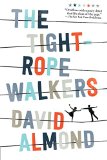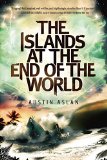Summary | Excerpt | Reviews | Beyond the book | Read-Alikes | Genres & Themes | Author Bio

In recent years, there's been much speculation about the various ways in which global warming might affect land, weather, water, wildlife, and even culture, but most of the rhetoric revolves around that keyword, "warming." Few of us have probably stopped to envision what might happen if climate change moved in the other direction. That's exactly what S. D. Crockett has done in her stunning debut novel, After the Snow, in which she imagines a Britain plunged into darkness and bitter cold.
The year is 2059. At the center of the novel is 15-year-old Willo Blake, who remembers nothing of the world before the ice and snow that characterize the apocalyptic landscape in which he lives. His world is also a brutal one, as a nebulous power structure seizes the city's means of production, and uses bureaucratic barriers and threats of violence (not to mention violence itself) as a means of keeping the already starving population further suppressed. Readers encounter this world through Willo's own observations, delivered in a lyrical but idiosyncratically colloquial first-person narration that offers an oblique commentary on the disintegration of cultural—including linguistic patterns—in this cold new world. The style of narration might remind some older readers of Russell Hoban's Riddley Walker.
After the Snow (targeted at young adults but with appeal for older readers) opens with Willo witnessing his family - who have been able to remain outside of government scrutiny thanks to their secluded location on a remote mountain - being herded onto trucks and driven away. Willo is determined to find them, but when he accidentally encounters a starving girl, Mary, and her younger brother, he is surprised to discover that he can't simply walk away, that perhaps he is capable of more compassion towards a stranger than he initially thought. In the beginning of the novel, Willo is immersed deeply in his own imagination - talking only to himself and to the imaginary dog who accompanies him - but Mary, with her combination of fragility and surprising talents, continues to surprise Willo and to draw him out of himself and back into the realm of human interaction.
When Willo and Mary sneak their way into the city, Willo - who is largely unfamiliar with urban life - must negotiate an unfamiliar landscape and navigate alien social interactions while wrestling with his responsibility both to his family and to Mary. Crockett's narrative offers an intimate, dramatic glimpse into Willo's bleak world and his rather extraordinary coming of age.
The animalistic nature of humanity is right on the surface in After the Snow. Willo wears a dog skull as a helmet at the novel's opening, so he can "get the power of the dog strong inside me." In a particularly harrowing scene, Mary and Willo are beset by a pack of starving, half-wild dogs; when they travel to the city and witness the brutality that the residents inflict on one another, it's easy to draw parallels between the instinctual violence of animals, and the more shocking cruelty and brutality of humans. Willo's attempts to recognize and overcome these impulses, while living up to his father's call to be "beacons of hope," is a central motif of the novel.
The world Crockett has created might be extreme in a number of ways, but it's likely to prompt readers to consider the role of evil, compassion, brutality, and cooperation in their own contemporary lives too. Willo is always curious about the time before the snow; he recalls his father's words: "All the bad things been waiting, kind of hiding under the ground like the grass wait under the snow for summer to come. Except they ain't been good things like grass but bad things - all the angry things and hungry things, and my dad say 'the animal bit' inside people's heads."
After the Snow offers readers both a warning - a stark meditation on what might happen in the future - and an opportunity to reflect on how we live, and who we are in the world, now.
![]() This review was originally published in The BookBrowse Review in April 2012, and has been updated for the
September 2013 edition.
Click here to go to this issue.
This review was originally published in The BookBrowse Review in April 2012, and has been updated for the
September 2013 edition.
Click here to go to this issue.

If you liked After the Snow, try these:

by David Almond
Published 2016
In a raw and beautifully crafted bildungsroman, David Almond reveals the rich inner world of a boy teetering on the edge of manhood.

The Islands at the End of the World
by Austin Aslan
Published 2015
In this fast-paced survival story set in Hawaii, electronics fail worldwide, the islands become completely isolated, and a strange starscape fills the sky.
The dirtiest book of all is the expurgated book
Click Here to find out who said this, as well as discovering other famous literary quotes!
Your guide toexceptional books
BookBrowse seeks out and recommends the best in contemporary fiction and nonfiction—books that not only engage and entertain but also deepen our understanding of ourselves and the world around us.